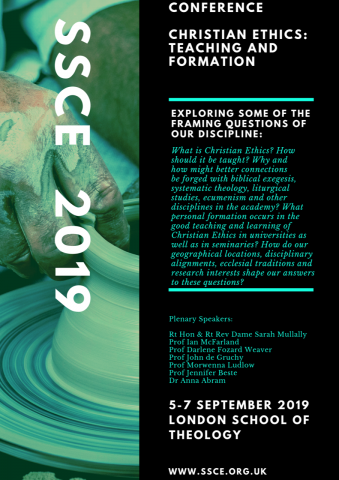Christian Ethics: Teaching and Formation
London School of Theology
5-7 September 2019

Keynote Speakers
- Prof Darlene Fozard Weaver, Professor of Theology, Duquesne University: 'Christian Formation and Moral Pluralism: Challenges and Opportunities'
- Prof John de Gruchy, Emeritus Professor at the University of Cape Town and Extraordinary Professor at the University of Stellenbosch: 'On Knowing Whether "To Seize the Wheel": Christian Formation and the Ethics of Necessity'
- Prof Morwenna Ludlow, Professor of Christian History and Theology, University of Exeter: 'Christian Discourse and Formation: Making and Being Made'
- Prof Ian McFarland, Robert W. Woodruff Professor of Theology, Candler School of Theology at Emory University: 'Being Perfect: A Lutheran Perspective on Ethical Formation'
And a roundtable discussion on the conference theme, chaired by Prof Brian Brock (University of Aberdeen), featuring:
- Rt Hon & Rt Rev Dame Sarah Mullally DBE, Bishop of London
- Prof Jana Bennett, Professor of Moral Theology, University of Dayton
- Prof Jennifer Beste, Koch Chair for Catholic Thought and Culture, St John's University
- Dr Anna Abram, Principal, The Margaret Beaufort Institute of Theology
- Dr Guido de Graaff, Director of Studies and Tutor for Christian Doctrine and Ethics, St Augustine's College of Theology
Short Paper Presentations
- Elizabeth Sweeny Block, 'Doing and Teaching Christian Ethics: Forming Consciences, Expanding Worldviews, Igniting Moral Imaginations'
- Robert W. Heimburger, 'Does Colombia need forgiveness to achieve peace? Colombian conflict survivors' Christian vision of forgiveness in dialogue with Martha Nussbaum's philosophy of forgiveness'
- Brett McCarty and Warren Kinghorn, 'Therapy for Healthcare: Christian Ethics and the Formation of Medical Practitioners'
- Brian Brock, 'Beyond the monologue: A Theological inquiry into pedagogical style'
- Paul Martens, 'Reviewing Christian Ethics and Moral Theology Textbooks'
- Nicholas Townsend, 'Reviewing Christian Ethics and Moral Theology Textbooks'
- Jana Bennett, 'Reviewing Christian Ethics and Moral Theology Textbooks'
- Mark J. Allman, 'Nones, iGen, and teaching Christian Ethics in the 21st Century'
- Andrew Hayes, 'The place of disruption/deconstruction in learning and formation: questions emerging from a theological action project'
- Jennifer Beste, 'Integrating Christian Ethics with Ignatian Spirituality'
- Andrew Errington, 'Wisdom, practical knowledge, and Christian ethics'
- Edward A. David, 'A Tale of Two Thomases: the theology of Piketty's Capital in the Twenty-first Century'
- Maja Whitaker, 'The Disabled Resurrection Body and Human Flourishing: Allowing Eschatological Possibilities to Inform Ethics
- Brandy Daniels, 'An Ethics of Unformation? Identity, Different, and Privilege: A Negative Theopolitical Proposal'
- Jeffrey P. Bishop, 'Tekhne, Liturgy, and participation'
- Margaret D. Kamitsuka, 'How Might One Teach Controversial Ethics Issues Ethically?'
- Margaret B. Adam and David Clough, 'Ethics in Academy and Church: Challenging and Encouraging Churches to Align Faith and Practice'
- Stacey Rand, 'Applying Volf's ethical framework of Work in the Spirit to unpaid care'
- Gary P. Hall, 'Dialectical tensions and relational dynamics: exploring theological formation, ethics and autography with Thomas Merton'
- Matthew Mason, 'Contemplation and moral formation in John Webster's moral theology'
- Seongho Kang, 'Assimilation of Narratives and Moral Crisis'
- Ondrej Fischer, 'From Professional to Christian Ethics?'
- Taylor D. Holleyman, 'A Method for Christian Ethics: Reviving Emil Brunner's Moral Theology'
- Louise Prideaux, 'Against polarization: forming a sense of "otherness" from a conversation between anthropology and neo-Calvinism'
- Ximian Xu, 'Herman Bavinck's Doxological Account of Dogmatics and Ethics'
- Medi Ann Volpe, 'Montessori and moral formaton: what her method has to teach us about teaching Christian ethics'
- Rory Philips, 'Christian ethics as an ethics of Freedom: A Lutheran perspective'
- Zachary Brigante, 'Teaching Ethics More Effectively: The Effects of Public Declaration and the Perception of Judgment'
